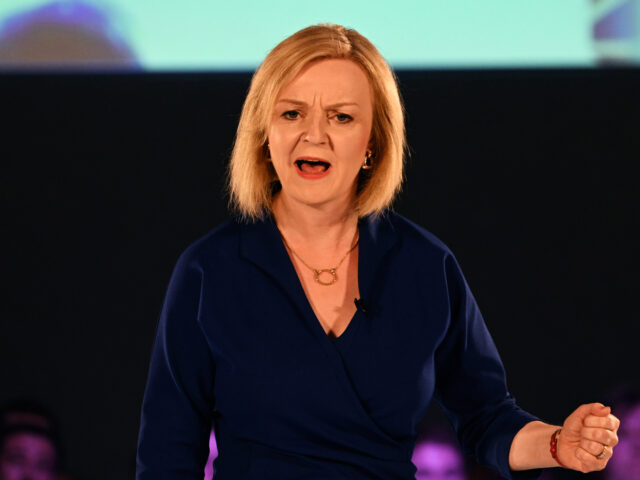In what could spell a significant reversal of foreign policy for the last three Tory leaders, Prime Minister Liz Truss is reportedly planning on officially designating China a “threat” to the UK for the first time.
Liz Truss, who succeeded Boris Johnson as prime minister last month, is looking to dismantle more of the previous regime’s policy positions, with reports emerging that the new government will look to overturn the previous decade of attempts to cosy up to the communist regime in Beijing.
According to a report from the Daily Telegraph, which shares a close relationship with the governing Conservative party in Britain, Truss is currently conducting an update to Boris Johnson’s 2021 Integrated Review on China, changing the government’s stance from viewing the murderous dictatorship as a “systemic competitor” to a being considered the “most serious long-term threat to our values and way of life”.
The review is expected to be released to the public within the coming days. It follows a speech this week from the head of the Government Communications Headquarters (GCHQ) intelligence agency, Sir Jeremy Fleming, who warned that China’s growing technological prowess is a “threat to us all“.
Fleming signalled out China’s BeiDou satellite navigation system, an alternative to the American-run Global Positioning System (GPS), as a chief concern, noting that it could not only be used to interfere with Western satellites in a potential conflict, but also to be used as a global surveillance tool to spy on the West.
The potential sea change on the government’s stance could have a serious impact on China’s ability to advance its military technology given that over the past two years reports have emerged that top British universities have been working on joint research projects with people connected to the Chinese defence apparatus.
For instance, some 33 universities, including Cambridge, have been accused of developing nuclear weapons technology with people tied to the Chinese Academy of Engineering Physics (CAEP), the chief nuclear weapons developer for the Chinese government.
Growing Chinese Technological Authoritarianism a ‘Threat to Us All’ – UK Intelligence Headhttps://t.co/Vhxa4SHaPC
— Breitbart London (@BreitbartLondon) October 11, 2022
While the change in stance towards China was welcomed by hawks such as former Tory leader Sir Iain Duncan Smith — who was personally sanctioned by Beijing for his efforts to classify the human rights atrocities being committed in Xinjiang as a genocide — and Minister of State for Security Tom Tugendhat, the hardline approach may see some pushback from the pro-China establishment within the Tory Party.
Each of Liz Truss’ three Conservative prime minister predecessors sought to deepen ties with China, starting with David Cameron, who alongside former Chancellor George Osbourne celebrated fostering a “golden era” between Britain and China during their time in office. Following his departure from Downing Street, Cameron would go on to attempt to spearhead a £1 billion investment fund with Chinese partners.
This friendly stance was continued under Theresa May’s so-called ‘Operation Kowtow‘, in which concerns raised about potential Chinese espionage were overlooked in favour of political expediency.
While Prime Minister Boris Johnson took some potshots at Beijing, including banning Huawei from the nation’s 5G networks, he openly described himself as a “Sinophile” and continually pressed for a major post-Brexit trade deal with the Asian economic powerhouse, despite China openly violating the terms of the Sino-British Joint Declaration on Hong Kong during his time in office. Mr Johnson’s family, including his brother and father, have both shared close relationships in China.
‘Operation Kowtow’ — Ex-PM May’s Top Adviser Admits UK Submission to ‘Brutal’ Chinese Regime was ‘Naive’ https://t.co/yEy5IhxOmR
— Breitbart London (@BreitbartLondon) April 21, 2020
The connections between China and the UK are not limited to the Tory Party, however, with former Labour Prime Minister Tony Blair previously serving as a go-between for Abu Dhabi and the “highest levels of the Communist Party and state-run corporations” in the Xinjiang region of China. Blair is also reported as having been paid £237,000 — more than his entire yearly salary as PM — for a single speech delivered in the Chinese industrial city of Dongguan in 2007.
Last year, Westminster was rocked by allegations that members of the Labour Party had accepted hundreds of thousands of pounds sterling from Christine Lee, who has been accused of acting as a spy for the Chinese state in London for years.
Time will tell what impacts the change in classification of China as a “threat” will mean in practice, however, during her leadership campaign over the summer, Truss argued that the West should not fall into the same trap of over-reliance on China as it did with Russia.
“We can’t be strategically dependent on China… We have to learn from the mistakes we made of Europe becoming dependent on Russian oil and gas. We cannot allow that to happen with China. Freedom is a price worth paying,” Truss said in July.
Exclusive: Top Tory Says Invest in British Workers Instead of Relying on ‘Cheap’ Chinese Products https://t.co/z8mqg8Z4zm
— Breitbart London (@BreitbartLondon) October 6, 2021
Follow Kurt Zindulka on Twitter here @KurtZindulka

COMMENTS
Please let us know if you're having issues with commenting.